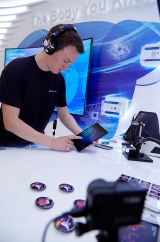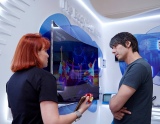The Hamlyn Centre participates in annual Summer Science Exhibition
by Jo Seed

Researchers at the Hamlyn Centre let their sensors do the talking at the Royal Society's annual Summer Science Exhibition.
 Colleagues from the Institute of Global Health Innovation’s Hamlyn Centre for Robotic Surgery exhibited at this year’s Royal Society Summer Science Exhibition from the 30th of June to 5th July 2015.
Colleagues from the Institute of Global Health Innovation’s Hamlyn Centre for Robotic Surgery exhibited at this year’s Royal Society Summer Science Exhibition from the 30th of June to 5th July 2015.
Their interactive exhibition stand ‘The Body You Know’ showcased their latest research developments in the field of body sensing and body sensor networks.
Body sensor network technology opens a world of possibilities for improving our health. In the elderly, and those with chronic diseases, wearable sensors can flag signs of deterioration so that doctors or carers can take action to prevent a crisis.
Current healthcare tends to ‘react’ to episodes of acute ill health. But by acting on the warning signs picked up by body sensors – such as changing heart rhythm, or breathing – health professionals could more often prevent sudden downturns in vulnerable patients. Through links to mobile devices and social media, body sensing technology could also encourage more of us to stick to healthy habits.
The Hamlyn Centre Co-Founder, Professor Guang-Zhong Yang said “We were delighted to have the opportunity to exhibit at this exciting and informative annual event. Here at the Hamlyn Centre, we are working towards advancing the technology to make sensing systems better, smaller and more intelligent and it was great to be able to demonstrate to the public the many uses and potential improvements to healthcare that sensing and medical robotics can create”.

The ‘Body you Know’ stand was very popular and was one of the few
selected to be visited by well-known Physicist Professor Brian Cox OBE, as well as several members of parliament including conservative MP for London and Westminster Mark Field.
Check out the photos and watch the short video below for more information and visit the Body You Know website to find out more about the project.
The Body You Know team are also running a survey looking into the best place on the body to place a sensor. Have your say and take part here.
Article text (excluding photos or graphics) © Imperial College London.
Photos and graphics subject to third party copyright used with permission or © Imperial College London.
Reporter
Jo Seed
Institute of Global Health Innovation
